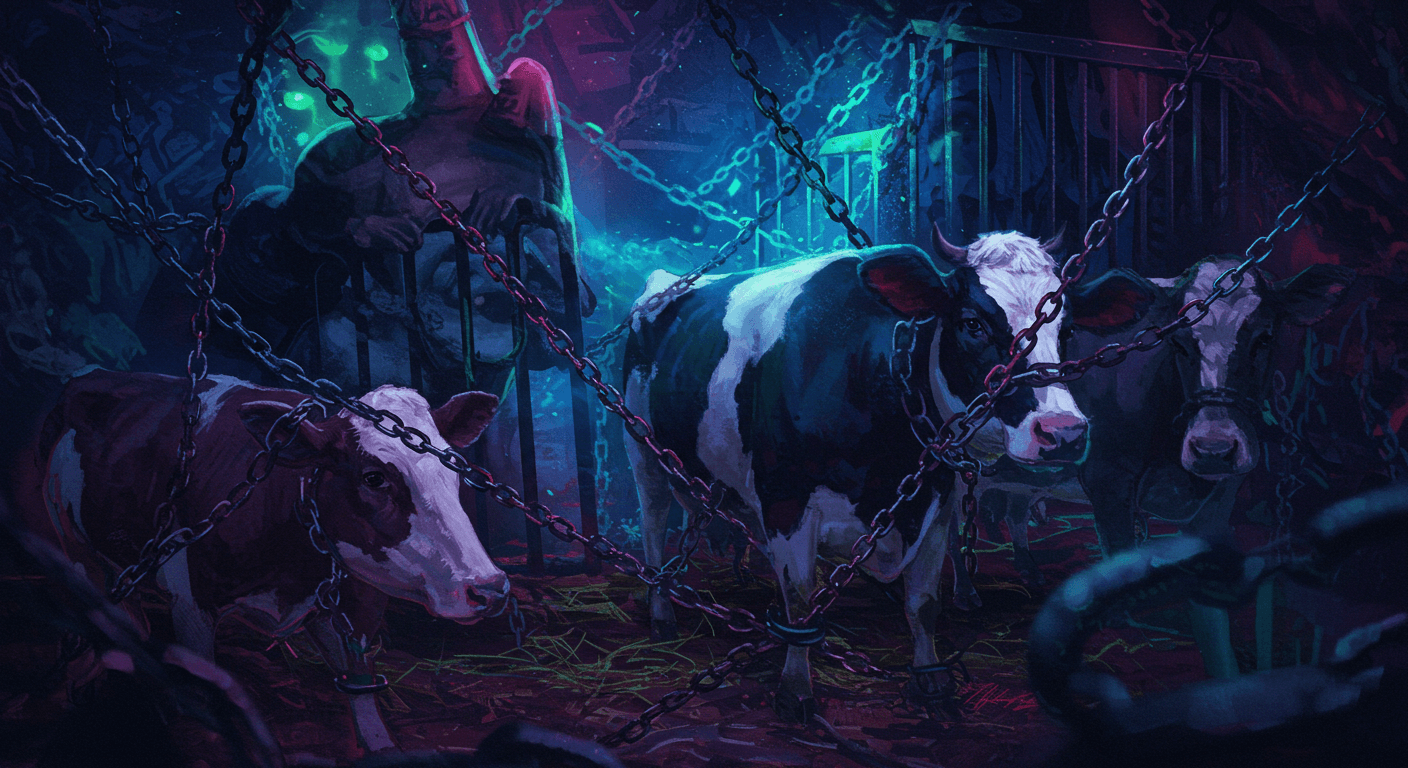The Bigger Picture
It’s not radical, it’s just consistent.
The Moral Imperative

My journey didn’t start with politics or economics. It started with a gut-punch realization about the suffering I was ignoring every day.
Choosing veganism isn’t just about changing what’s on your plate. It’s about finally refusing to look away. Most people claim to care about animals. Most people believe in compassion, fairness, and doing the right thing. But somehow, when it comes to what we eat, all of that gets thrown out the window. We create a blind spot and society makes it easy to keep it that way.
The truth is simple and brutal. Animals suffer. Not in some abstract, faraway sense. They suffer in cages, in crates, in fear, every single day. They’re mutilated, confined, force-bred, and eventually slaughtered while still babies or adolescents. Not because we need to survive, but because we like how it tastes.
And we’re told that’s normal. We’re told it’s tradition. Culture. Personal choice. But personal choice ends where someone else’s body begins. And deep down, most of us already know this. That’s why it’s so uncomfortable to talk about. That’s why people get defensive. Because to confront the truth means confronting ourselves. It means admitting we’ve been complicit in something we never actually agreed with.
Veganism is not about being perfect. It’s about no longer participating in a system built on exploitation. It’s about aligning your actions with your values. If you believe animals shouldn’t be abused, if you believe violence should never be normalized, then veganism isn’t extreme. It’s consistent.
It's not always easy. But it’s worth it. Because choosing not to harm others, even when it's inconvenient, is what integrity actually looks like. And once you see it, you can’t unsee it. You can try to forget, but it lingers. It itches at your conscience. And at some point, you either keep lying to yourself... or you change.
That’s why vegan. Not for a label. Not to be better than anyone. But to stop pretending we’re powerless in a world that runs on avoidable harm. We can do better. We just have to care enough to act like it.

But here’s the thing: animal exploitation doesn’t happen in a vacuum. It’s not a random flaw in an otherwise good system — it is the system. The same logic that allows us to look away from animal suffering is the logic that fuels environmental collapse, wealth inequality, and rising authoritarianism.
Corporate greed is the backbone of the exploitation that underpins our modern world. It’s easy to see it happening if you look at the trajectory of countries that have slid into authoritarianism. Take Hungary, for example. In just a decade, it went from a functioning democracy to a full-blown single-party autocracy. Viktor Orbán’s rise to power was rooted in a right-wing populist backlash after a financial crisis. Once in office, he didn’t just consolidate power, he dismantled the democratic institutions that could challenge him.
He packed the courts with right-wing judges, redrew parliamentary districts to favor his party, and manipulated voting laws to ensure his supporters had an easier time winning. He enriched a small group of cronies who then bought up the media, creating a propaganda machine that supported his nationalist agenda. Orbán framed the political discourse as ‘us versus them’ — us being the "true" Hungarians, and them being immigrants, Muslims, liberals, elites, and so on.
Sound familiar? Because the playbook Orbán used is the exact same one gaining ground in the US.
The rise of right-wing populism in the US is not some distant hypothetical. It’s happening now. From voter suppression to attacks on the free press to gerrymandering and the stoking of nationalist sentiments, we’re seeing the same tactics being used to consolidate power and erode democratic institutions.
The goal isn’t just winning an election, but rather fundamentally changing the structure of power so that the wealthy elite stay in control, and the majority of people are left fighting over crumbs. It’s not about serving the public or protecting individual rights anymore; it’s about creating a reality where only the privileged few thrive while everyone else gets squeezed for what they can give.
And it’s no coincidence that these same systems are also pushing for environmental destruction and corporate exploitation. It's all part of the same cycle of control, profit, and inequality.
And this isn't just a problem in Hungary or the US. Around the world, authoritarian regimes and corrupt systems of power are flourishing, using similar tactics to gain and maintain control. Russia, Poland, Brazil, the playbook is strikingly similar in each case. It's all about concentrating power in the hands of a few while dividing the masses into ‘us versus them.’ And the ‘us’ they refer to is almost always some version of a privileged, often white, majority, and the ‘them’ are the vulnerable populations: immigrants, the poor, people of color, and anyone who dares challenge the status quo.
Meanwhile, the left is proposing policies that are already working in other parts of the world. Western European countries like Norway have managed to implement policies that benefit the majority of their populations. Norway, although still a capitalist country, has universal healthcare, free higher education, a much lower poverty rate, a higher life expectancy, and significantly higher GDP per capita.
These are the types of policies that are constantly demonized by the right as ‘socialism’ or the ‘equivalent of Venezuela,’ but they are standard in other developed nations, and they are driving success. The fact is, they work. And they are the kind of policies that most people in the US actually want — universal healthcare, better wages, workers’ rights, environmental protections, and social safety nets that ensure we all have a fair shot at life.
Even the Republicans of the mid-20th century understood the importance of high corporate taxes. In fact, during the Eisenhower administration, the top marginal tax rate for individuals was as high as 91%, and the corporate tax rate was over 50%. This was a time when the US economy thrived and the middle class expanded. Compare that to today’s tax structure, where corporate tax rates are at a paltry 21%, and the top 1% controls 70% of the wealth in the country.
The myth that lowering taxes for the wealthy will benefit everyone is just that... a myth. It’s a lie told by the elite to protect their interests, not ours.
If we continue to let these systems of corporate greed and authoritarianism dominate, we’ll end up with a future that only benefits the ultra-wealthy. But there’s still a choice. There’s still time to fight for a future that values fairness, justice, and environmental sustainability.

The corporate systems of greed and exploitation are out of control, but there’s a way out and it starts with a shift in the way we live, the way we consume, and the way we interact with the planet.
Animal agriculture is a prime example of how these systems bleed the planet dry while causing incalculable harm to both animals and humans. The resources spent on factory farming could be better used to fuel sustainable agriculture, reduce environmental destruction, and improve food security for the global population. The current system feeds corporate profits, but at the expense of everything else. It’s a wasteful, violent, and inefficient model that serves no one but the wealthy elite.
We can turn this around. Research, like Joseph Poore's groundbreaking study, shows that adopting plant-based diets and reducing animal agriculture is one of the most effective ways to reduce our environmental footprint. This goes way beyond personal ethics. It’s one of the most effective actions we can take to secure a livable future.
Every action we take, every decision we make in our consumption patterns, is part of this larger movement toward sustainability. And nothing you do will have more impact than ditching animal products. But it’s about more than just diet. It’s a shift in values. It’s about rejecting systems that exploit and destroy for profit, and building a world that prioritizes justice, compassion, and sustainability.
Ultimately, we have a choice: continue down the path of corporate exploitation and environmental devastation, or take action to create a world that benefits all people, animals, and the planet. The systems in place now are pushing us toward a dystopian future, but there’s still time to change course. It starts with us. It starts with fighting for the policies we know will work, dismantling the corporate structures that hold us back, and shifting toward a more compassionate, equitable, and sustainable world.
The first lie I stopped believing was that I needed to eat animals. But it was never just about food. It was about seeing the system for what it really is and choosing not to be complicit in it anymore.
Sources
- ASPCA: The Problem with Factory Farming
- 'Single biggest way' to reduce your impact on Earth
- Consumers’ Attitudes Towards Animal Suffering and Ethical Consumption
- Environmental Impact of Diets: Systematic Review of Vegan, Vegetarian, and Omnivorous Diets
- Plant-Based Diets, Health, and Environmental Sustainability
- Most Successful Countries in the World
- Misinformation and Radical-Right Populism Across 26 Countries
- This Is How Fascism Comes to America
- The Origins of American Fascism
- Foundations of Geopolitics
- Lest We Forget the Horrors
- Is Trump a Fascist?
- Is Hungary Still a Democracy?
- Hungary’s Threat to Democracy
- Trump and Orbán's Autocratic Alliance